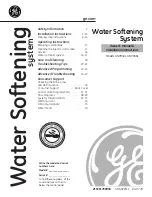
Section 6. Data Error Detection
6-7
The total
extra
processing time over and above the SDM-SIO4’s normal delay
is calculated by the following:
The extra time, in milliseconds, you must wait before trying to get the data from
the SDM-SIO4 =
a
+(one from
b
)+(one from
c
)+(
d
if applicable)
6.3 Transmitted Data
The SDM-SIO4 can also do transmission signature generation with the
calculated signature appended to the end of the string. This is done by the
formatter types ‘g’ and ‘G’. Formatter type ‘g’ is used to mark where signature
calculation should start and the type of signature/CRC to use. Formatter type
‘G’ is used to mark the end of signature generation, the position in the string
where the calculated signature will be transmitted and the transmitted signature
data format. The formatter types are described in detail below:
gn
This formatter type can be put into the formatter string to mark the start of a
signature generation. When this happens the signature type determined by ‘n’
will be initialized ready to start signature calculation for all characters until
formatter Gn is encountered. ‘n’ can be in the range of 0-255. The signature
types supported are shown below:
0
No Signature type used.
1
CRC16 standard. Polynomial x
16
+x
15
+x
2
+1.
2
CRC16-CCITT standard. Polynomial x
16
+x
12
+x
5
+1.
3
CRC16-CCITT-IBM (Tag Receiver).
4
CRC32 standard.
Polynomial
x
32
+x
26
+x
23
+x
22
+x
16
+x
12
+x
11
+x
10
+x
8
+x
7
+x
5
+x
4
+x
2
+x+1.
5
CSI Signature (CR10X user manual section C-4).
6
Check sum using modulo 256.
7
Check sum using modulo 8192 (CR10X user manual section 5-2).
8-255
reserved for future use.
Gn
This formatter type can be put into the formatter string to mark the end of the
string and the point at which the signature should be transmitted. It also sets the
data type to use. ‘n’ can be in the range of 0-255 which indicates the data type
to use. The data types that the SDM-SIO4 can deal with are as follows:
0
No data type or check.
1
8 bit binary. Expects 1 byte.
2
16 bit binary least significant byte first. Expects 2 bytes.
3
16 bit binary most significant byte first. Expects 2 bytes.
4
32 bit binary least significant byte first. Expects 4 bytes.
5
32 bit binary most significant byte first. Expects 4 bytes.
6
ASCII decimal. Waits until non ASCII 0-9 received.
Summary of Contents for SDM-SIO4
Page 6: ...SDM SIO4 Table of Contents iv This is a blank page ...
Page 12: ...Section 1 Introduction 1 6 This is a blank page ...
Page 16: ...Section 2 Installation and Hardware Set Up 2 4 This is a blank page ...
Page 26: ...Section 3 Understanding How the SDM SIO4 Handles Data 3 10 This is a blank page ...
Page 32: ...Section 4 Programming the SDM SIO4 4 6 This is a blank page ...
Page 62: ...Section 5 Programming the Datalogger 5 30 This is a blank page ...
Page 76: ...This is a blank page ...
Page 81: ...This is a blank page ...














































